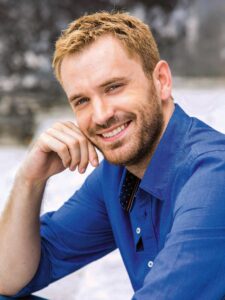Momčilo Otašević, actor
One of the most wellknown Montenegrin and regional actors, Momčilo Otašević, has built his career on talent, dedication, and a love for acting. His journey takes him from Rome to Cetinje, navigating through political science, architecture, law, and tourism, before ultimately dedicating himself to his first love – acting. Currently living and working between Zagreb and Cetinje, he balances film and theater engagements across the region. In this interview with our magazine, Momčilo reveals details about his professional journey, the challenges in Montenegro’s film industry, the importance of culture in social life, and his latest project, the film “Black Trumpet”, which has brought him particular fulfillment. He proudly speaks of Montenegrin cinema, the need for greater investment in culture, and the regional co-productions that truly connect people from the former Yugoslavia. Through his work, talent, and commitment, Momčilo has become an essential figure on the regional scene and a genuine advocate for the importance of culture and the arts in society.

Momčilo, before becoming a professional actor, you had very broad and amusing interests when it came to choosing a profession. At 18, you went to Rome to study political science and architecture. You also enrolled in Faculty of Law in Podgorica and tourism at a private university in Corfu. What influenced acting to ultimately prevail?
That’s right! Acting has always been my first love! However, the year I finished high school, there was no open call for new students at the Faculty of Dramatic Arts in Cetinje. So, at 18, I went to Rome with my friend Jovana Jovićević. She enrolled in political science and diplomacy at Sapienza University. I didn’t manage to do the same, even though, as a kid, diplomacy sounded interesting to me. I thought being an ambassador would be cool! However, I didn’t even get to the entrance exam for that faculty because I failed the Italian language test! My parents couldn’t believe it when I told them that. At the same time, I was accepted to the Faculty of Law in Podgorica and a private university in Corfu, where I enrolled in tourism. Still, I told my parents that I didn’t want to pursue any of those options. I told them I wanted to stay in Rome until the next admission period and think about my future. Meanwhile, many of my friends from Montenegro enrolled in architecture, and since that field had always interested me, I started attending lectures with them, even though I wasn’t officially a student! During this time, I delivered newspapers, worked as a bartender or a dog walker… Naturally, I became the main organizer of parties for students from the former Yugoslavia! In the next admission cycle, I applied for architecture and passed the Italian language test! Since I had two months before the next round of exams, I returned home to Cetinje. Upon returning, I ran into Ana Vučković, a longtime friend and now a colleague. When I told her I was going to study architecture, she simply said, “Come on, stop kidding!” She went into her house and came back with the book “Audition – Everything about the Entrance Exam” by Bora Stjepanović. She said, “Prepare two monologues and a song! The entrance exam for the Faculty of Dramatic Arts is in seven days!” I shared this news with my parents and decided to take the entrance exam. The day I stepped onto the stage, the feeling I had when I used to act in amateur plays came rushing back – I forgot about the world, time, place, air… For those 15 minutes, I just acted, enjoying every second, and felt on top of the world! I’m not exaggerating when I say that feeling was similar to seeing your child for the first time. On that stage, I realized I had been avoiding something I shouldn’t have. And I passed the preliminary round at the Faculty of Dramatic Arts! Afterward, in August, I returned to Rome to take the final part of the entrance exam for architecture. The exam lasted five hours. After three hours, I left, packed my bags quickly, and headed back.
The final selection for the Faculty of Dramatic Arts was already underway. Even though I was exhausted from the trip, the moment I stepped onto the stage, that beautiful feeling I had longed for returned. I still remember that Monday when the late professor Sanja Garić read my name from the list of accepted students. My happiness knew no bounds, even though I had also been accepted into architecture just a few days earlier. My parents were thrilled as well, despite the fact that I had chosen Cetinje over Rome! So, in the end, acting won out over all the other choices. Simply put, it was the path meant for me, and I’m still happy I chose it to this day!
Today, you are one of the most popular Montenegrin and regional actors. Across the former Yugoslav territories, you are equally engaged in films, TV series, and theater. How would you comment on the theater and film scene in Montenegro? And how do you assess regional cooperation?
First of all, I’ve always been proud to have studied in my hometown, in Cetinje. I’m equally proud of the numerous projects I’ve worked on in my country, considering the size of Montenegro, its population, and the scale of its productions. Speaking of the theater and film scene in Montenegro, I believe that, on an individual level, we are operating at a very high artistic level. There’s no lack of talent, intelligence, or willpower to succeed here! That said, in my opinion, there are never enough plays and never enough films! Montenegro is not lagging behind anyone, and we don’t need to bow to anyone. However, we need to value ourselves a little more than we currently do. Fortunately, considering the recent history of the former Yugoslav states, things are changing, and regional cooperation is quite strong. In recent years, there have been wonderful co-productions in the region, and I think that’s fantastic! Even better things are yet to come, as we all share the same language, which will lead to even more co-productions. The blending of cultures and peoples in this way is an excellent path to bring our nations closer again. That’s why I see artists from this region as peacemakers. Here, I’ll step back a bit, because I don’t consider myself an artist, at least not until I die. For now, I’m just a craftsman. I don’t like to preach or criticize too much, as I still consider myself too young for that. However, in Montenegro, we’ve had the same systemic issue for decades. I’m not involved in politics, nor do I follow it closely, but it’s a fact that the budget allocated for culture is shockingly low! I appeal for this to change if the decision-makers in Montenegro want us to have any presence on the artistic map! For comparison, an average film in Croatia, through the Croatian Audiovisual Centre (HAVC), gets around 500,000 euros. Meanwhile, in Montenegro, the average budget for a film is 100,000 euros. Given that, I almost feel like saying we’re better than everyone else because we make competitive films with incredibly low budgets! Even though that sounds terrifying in a way, I’ll still, as we say, “go all out” for Montenegrin cinema whenever necessary, and to the end! It’s high time we face the truth and restore culture to its rightful place at the top.

Artists also have their diplomatic mission. How do you see Montenegro’s current position in the world through the lens of culture and the arts? Do you think that your work and the work of your colleagues can contribute to greater recognition of Montenegro’s cultural and artistic heritage on a global level?
Our work is already contributing significantly to the recognition of Montenegro’s cultural and artistic heritage. Many generations of Montenegrin artists have contributed to this in the past, and that must continue in the future! I’m confident that, through the lens of culture and the arts, Montenegro has the quality to offer Europe and the world. I wouldn’t be doing this job if I didn’t believe that. I will do my best to help with all my knowledge and skill! Even though we are a small system, we are rich in content. Unfortunately, we must again return to the financial resources allocated for culture. As I mentioned, we create quite decent projects with much smaller funds compared to other countries in the region. With more resources, our work would be even better. Everything costs! In the end, the least expensive part is the actors’ work. Despite this, I firmly claim that everyone will “go all out” to create the best and highest quality Montenegrin film possible! I know that culture is an area where every cent is worth investing. Wise nations and people have been doing that for centuries! It’s our job, as actors, to work. There’s nothing controversial about that. The job of decision-makers is to create an environment where our work will have an even greater impact on a larger scale. Believe me, it will pay off for everyone many times over.
It’s clear that culture is a focal point of your interest, and you place it in a “sacred category.” Why does culture impress you so much? Can we bring more culture into the general social environment?
I’m glad that’s being noticed! Culture is incredibly important! And I’m not just talking about my profession. I mean the basics: not throwing a can out of your car window, helping an elderly lady cross the street at a pedestrian crossing, not overtaking another vehicle on a solid line, and many other everyday things. These are the basic elements we need to start with before we can even talk about theater or film. As a boy, I remember the biennale that took place in Cetinje, at a time when I was just discovering my love for art. I remember my mother taking me from one palace or park to another whenever there was a cultural or artistic event. The world was in Cetinje!
Even more than 100 years ago! We had an ice rink here, tennis courts, and the first woman in the Balkans to drive a car. After all, the first books in the South Slavic region were printed here. I’ll also mention the series “Budva on the Foam of the Sea”, no matter what people think of it. I believe that series was a phenomenal postcard of Montenegro, which hadn’t been seen since the brilliant works of Živko Nikolić. Even I, watching those extraordinary shots from all over Montenegro in the series, thought, “Man… do we really have all of this?” I’ll also remind you of the project to turn the former “Obod” printing house into a film city. It’s sad that the project wasn’t realized. Imagine being able to tell any internationally renowned production that we have four seasons clearly defined. As a result, you have various colours, important for a cinematographer, that occur during those four seasons. Then there’s the capital, Cetinje, just 15 to 30 minutes away from the sea, mountains, lakes, rivers, plains, Lovćen and Skadar Lake National Parks. Snow, heat, fog, and countless other weather conditions! In our profession, these are incredible resources! Time is everything in this business! For filming, it’s a huge advantage when you have a visually important location nearby. That costs! Unfortunately, the battle for positions in power and “chairs” often blocks culture and its workers. I know that what I’m talking about may sound unrealistic and impossible to an ordinary bureaucrat. But it can be done! For all these reasons, I cannot accept that there is no room for culture in Montenegro. On some subconscious level, I also act out of a desire to restore the lost splendor that the nature of this place deserves to have! When we think about how few of us there are, yet how successful we are in various fields, it’s almost a shame that we aren’t legends in Europe! I believe we can be!

We live in an era of general digitalization, where so-called Artificial Intelligence is increasingly taking over. Technology has the power to bring art closer to a broader audience, but there is often criticism that digital formats can diminish the authenticity of the artistic experience. How do you assess the balance between the benefits technology brings to art and the risk of losing the essence of artistic expression?
The essence of artistic expression absolutely must be preserved! Even though modern technology is already widely used, I’m quite shocked when I see the power that Artificial Intelligence has. Now, in five minutes, through AI, you can type out song lyrics, adjust the voice of a well-known performer (like Oliver Dragojević, the band “Perper”, etc.), and suddenly create complete chaos with it! You can easily publish news about the release of “such and such” a song and confuse the public! I’m particularly concerned about theater. I’m a huge lover of theater and still believe in it, but I fear how it will continue to exist and function under these circumstances. I don’t live under any illusion. High technology has already made its way into our field. I often joke and say it’s an impudence. I believe it has its application here, but boundaries must be set, otherwise art, as we know it, will lose its meaning entirely.
The latest project you worked on is the feature film “Black Trumpet”, in which you play the lead role. The film was produced by the company “Cut-Up” Ltd. from Podgorica and was filmed over 20 days in locations in Grahovo and the surrounding area. Can you share some impressions from the set?
I dare say that, for the first time in my life, as far as filming is concerned, I am completely satisfied with my work and my role in this film! We filmed the movie in June of this year. It’s the debut feature of director Bojan Stijović, based on a script by Stefan Bošković, and produced by Veliša Popović and his production company “Cut-Up”. The director of photography was Dušan Grubin. I should mention that Marko Janketić and I play brothers. Alongside us, the cast includes Milica Janevski, Srđan Grahovac, Gorana Dragašević, Strahinja Bubanja, and others. A sad detail from this project is that our dear colleague and great actress Ratka Mugoša passed away just a few days after filming wrapped. Whether it was fate or not, I’ll share a detail from shooting an important scene that involved Ratka and me: while I was off-camera, acting as Ratka’s partner, I literally cried for the entire two hours the shoot lasted, without any particular reason! The director even had to warn me to stop crying when it was my turn. I had the opportunity to perform with her in the play “The Fisherman’s Quarrels”… Overall, I was thrilled with this project even when I first read the script, and I realized it offered a beautiful space for me, as an actor, to be fulfilled and give everything I had, to my very limits. The story is extremely heavy and intriguing. We filmed the entire movie in just 20 days! We filmed both at night and during the day, with many extremely demanding scenes. I surprised myself positively on several occasions! There were no compromises; we worked to the limit of endurance! Despite that, I believe the result will be really, really good! The entire crew, small but carefully chosen, was wonderful! This is Stika’s first film, and finally, after four or five years, I got to make a film in my own country. Because of all this, I was deeply motivated to give my best effort. I have such beautiful emotions connected to this project! I’m proud of the entire team and Montenegrin cinema in general! I can say – I can’t wait for the premiere, which I expect next summer. I’m sure the audience will enjoy it!